|
|
|
Sort Order |
|
|
|
Items / Page
|
|
|
|
|
|
|
| Srl | Item |
| 1 |
ID:
093627


|
|
|
|
|
| Publication |
2009.
|
| Summary/Abstract |
Canada's 2005 International Policy Statement announced that the Department of Foreign Affairs and International Trade and the Department of National Defence and the Canadian Forces were committed to "whole of government" interventions in failed and fragile states. This led both the Canadian government and outside observers to declare that Canada was successfully harmonising the aims and practices of its internationally focused departments and crafting a synergised approach to interventions in failed and fragile states. Drawing on Halperin and Clapp's organisational theory of bureaucratic politics, this paper argues instead that the foreign affairs and defence departments embraced the idea of failed and fragile states to reinforce their organisational essences and recycle their existing missions, roles, and capabilities. In addition, the departments used a "whole of government" approach to secure their autonomy, fence their respective functions, and enlarge their unique capabilities, under the guise of greater efficiency.
|
|
|
|
|
|
|
|
|
|
|
|
|
|
|
|
| 2 |
ID:
143014


|
|
|
|
|
| Summary/Abstract |
As the Obama administration's tenure winds down and the United States withdraws nearly all of its troops from Afghanistan, debates about the nature and scale of future U.S. involvement in Afghanistan continue. President Obama has committed to withdrawing all but a minor residual force by the end of 2016. On the other hand, Afghan President Ashraf Ghani has called for a sizeable U.S. military presence long after President Obama leaves office, and recent setbacks in Iraq have strengthened the hand of Congressional leaders, U.S. military officers, and others who call for an enduring commitment.
|
|
|
|
|
|
|
|
|
|
|
|
|
|
|
|
| 3 |
ID:
178521
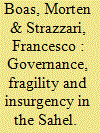

|
|
|
|
|
| Summary/Abstract |
Once a region that rarely featured in debates about global security, the Sahel has become increasingly topical as it confronts the international community with intertwined challenges related to climate variability, poverty, food insecurity, population displacement, transnational crime, contested statehood and jihadist insurgencies. This Special Issue discerns the contours of political orders in the making. After situating the Sahel region in time and space, we focus on the trajectory of regional security dynamics over the past decade, which are marked by two military coups in Mali (2012 and 2020). In addressing state fragility and societal resilience in the context of increasing external intervention and growing international rivalry, we seek to consider broader and deeper transformations that can be neither ignored nor patched up through the framework of the ‘war on terror’ projected onto ‘ungoverned spaces’. Focusing especially on the mobilisation of material and immaterial resources, we apply political economy lenses in combination with a historical sociological approach to shed light on how extra-legal governance plays a crucial role in the deformation, transformation and reformation of political orders.
|
|
|
|
|
|
|
|
|
|
|
|
|
|
|
|
| 4 |
ID:
117629


|
|
|
|
|
| Publication |
2012.
|
| Summary/Abstract |
This article explores the empirical determinants of state fragility in sub-Saharan Africa over the 1992-2007 period. Our dataset includes those sub-Saharan countries for which we have information on the distribution by quintiles of the World Bank Country Policy and Institutional Assessment (CPIA) ratings. We evaluate the potential influence on fragility of a wide range of economic, institutional, and historical variables. Among economic factors, we consider per-capita GDP, both in levels and growth rates, investment, natural resources, and schooling. We also consider economic policy variables such as government expenditures, trade openness, and inflation. Demographic forces are accounted for through the fertility rate, life expectancy, and the youth bulge. Institutional factors are captured by measures of ethnic fractionalization, civil liberties, revolutions, and conflicts, as well as governance indicators. Moreover, we select historical variables that reflect the colonial experience of the region, namely the national identity of the colonizers and the political status during the colonial period. Finally, we account for geographic factors such as latitude, access to sea, and the presence of fragile neighbors. Our central findings is that institutions are the main determinants of fragility: even after controlling for reverse causality and omitted variable bias, the probability for a country to be fragile increases with restrictions of civil liberties and with the number of revolutions. Before controlling for endogeneity, economic factors such as per-capita GDP growth and investment show some explanatory power, but economic prosperity displays a contradictory net impact since growth reduces fragility while investment facilitates it. Moreover, instrumental variables estimates show that per-capita GDP growth is no longer a significant factor. Colonial variables display a marginal residual influence: after controlling for all other factors former colonies are actually associated with a lower probability of being fragile.
|
|
|
|
|
|
|
|
|
|
|
|
|
|
|
|
| 5 |
ID:
124515
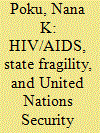

|
|
|
|
|
| Publication |
2013.
|
| Summary/Abstract |
When, in 2000, the United Nations Security Council (UNSC) discussed a global response to the growing HIV/AIDS pandemic, it was the first time in the institution's history that its members had debated a non-mandated issue. The preserve of this institution had, until then, been focused on preventing wars and the proliferation of weapons of mass destruction. Yet the mounting evidence on the societal impacts of HIV/AIDS was no less devastating for affected communities. In most heavily affected societies, the prevalence of HIV/AIDS doubled in less than ten years. But was the case that led to UNSC Resolution 1308 overstated? This article revisits the case that led to the Security Council meeting and argues that, far from being overstated, Resolution 1308 helped to avert a crisis of unimaginable proportions.
|
|
|
|
|
|
|
|
|
|
|
|
|
|
|
|
| 6 |
ID:
183259


|
|
|
|
|
| Summary/Abstract |
In the past year, climate change and national security have received significant attention from policymakers in the United States and the international community. Despite high-level meetings and statements on the topic, however, climate change is not yet fully mainstreamed into policymakers’ national-security agendas, particularly in areas related to geopolitical competition and governance. Better integration of climate-related predictive capabilities into national-security planning and the development of an interdisciplinary, scientifically literate national-security workforce are needed to address this gap.
|
|
|
|
|
|
|
|
|
|
|
|
|
|
|
|
| 7 |
ID:
154472
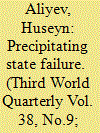

|
|
|
|
|
| Summary/Abstract |
This article examines whether the incidence of civil wars and the presence of violent non-state actors have an effect on state failure. Research on failed states has thus far prioritised armed conflicts as one of the key causes of state failure. This study challenges that claim and posits that civil war incidence has limited impact on the transition from fragility to failure. Global quantitative analysis of state failure processes from 1995 to 2014 shows that although armed conflicts are widespread in failed states, civil violence does not lead to state failure and large numbers of failed states become engulfed by civil war only after the failure occurs. By contrast, this study demonstrates a direct link between the presence of violent non-state actors and state failure.
|
|
|
|
|
|
|
|
|
|
|
|
|
|
|
|
| 8 |
ID:
152883


|
|
|
|
|
| Summary/Abstract |
This article is one of the first to systematically assess the ability of state fragility measures to predict violent protests and adverse regime changes in countries. We focus on the Arab Spring as an example of a situation that such measures ought to predict. Through a variety of analyses, we find that none of the measures are predictive. We then create a simple model using the literature of protest and revolts to predict both the level of violence and the extent of regime change in the Arab Spring countries. This simpler model does a better job of predicting the level of involvement in the Arab Spring than any of the complex State Fragility Indexes. Thus, the goal of this article is not to explain the causes of the Arab Spring, but to add to the discussion of the predictive value of measures of instability.
|
|
|
|
|
|
|
|
|
|
|
|
|
|
|
|
| 9 |
ID:
161122
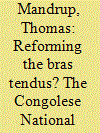

|
|
|
|
|
| Summary/Abstract |
The security sector reform (SSR) programme in the Democratic Republic of the Congo (DRC) has failed, according to a former high-level member of the United Nations (UN) mission in the DRC, as a large section of the country remains outside government control, and the security institutions of the state continue to constitute one of the predominant sources of insecurity for the local population in a number of ways. Based on several field studies, this article critically scrutinises the SSR of the Congolese National Police (Police nationale congolaise; PNC) and the efforts to reform it between 2004 and 2016. It further attempts to explain why so little progress was made in the SSR of the PNC, despite extensive involvement from donors. The article shows that the instrumental and traditional approach to SSR is partly to blame, because in this case it failed to address the root problems and initiate the needed fundamental reform and reconstruction of the police force. It also shows that reforming local security institutions becomes even more difficult when the local authorities do not support the effort.
|
|
|
|
|
|
|
|
|
|
|
|
|
|
|
|
| 10 |
ID:
170994
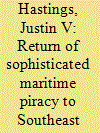

|
|
|
|
|
| Summary/Abstract |
What explains the recent (perhaps temporary) resurgence of sophisticated maritime pirate attacks in Southeast Asia in the face of strong regional counter-piracy efforts? Given Southeast Asian countries' relatively well-functioning institutions, political, economic, and conflict-related explanations for the return of piracy are incomplete. As an innovative extension to structural arguments on piracy incidence, we take an approach that focuses on adaptation by the pirates themselves, using incident-level data derived from the International Maritime Organization to track how sophisticated pirate organizations have changed what, where, and how they attack. In response to counter-piracy efforts that are designed to deny pirates the political space, time, and access to economic infrastructure they need to bring their operations to a profitable conclusion, pirates have adapted their attacks to minimize dependence on those factors. Within Southeast Asia, this adaptation varies by the type of pirate attack: ship and cargo seizures have shifted to attacks that move quickly, ignore the ship, and strip only cargo that can be sold profitably, while kidnappings involve taking hostages off ships to land bases in the small areas dominated by insurgent groups. The result is a concentration of ship and cargo seizures in western archipelagic Southeast Asia, and a concentration of kidnappings in areas near Abu Sayyaf Group strongholds.
|
|
|
|
|
|
|
|
|
|
|
|
|
|
|
|
| 11 |
ID:
124489


|
|
|
|
|
| Publication |
2013.
|
| Summary/Abstract |
The emergence of the Islamic sect, Boko Haram, and its transformation into a terrorist organisation has dominated recent discourse in the fields of political science and security studies, both within and without the socio-politico enclave known as Nigeria. Much of the discussion has centred on the extra-judicial execution of its founder, Mohammed Yusuf, which purportedly intensified the radicalisation of the group, and whether or not the sect receives operational and/or financial support from foreign terrorist associations. The interest of others has been to forecast the possibility of the internationalisation of the group's activities. This paper aligns with those whose interest is to identify and proffer ways of resolving factors that predisposed the Nigerian state to the levels of violence perpetrated by Boko Haram, with a view to averting much greater crises in the future. It adopts some historicism in demonstrating that the responsibility for the deepening insecurity in the country resides in the Nigerian state structure, which has often been seen as willing to sacrifice the well-being of the many for the benefit of a few. On the whole, the paper utilises state fragility as the framework of analysis by identifying the incapacity of the state in effective service delivery, which has as a result created a situation of mass unemployment and extreme poverty that has fanned the Boko Haram uprising. It concludes that a sustainable solution to the crisis lies in addressing the root causes of inequality, unemployment and poverty, with which most Nigerians, particularly in the north, subsist.
|
|
|
|
|
|
|
|
|
|
|
|
|
|
|
|
| 12 |
ID:
140330


|
|
|
|
|
| Summary/Abstract |
This article uses the Country Indicators for Foreign Policy (CIFP) fragile states framework to evaluate fragile state transitions. Our objective is to find out why some states considered fragile have recovered, while others remain fragile for long periods. We identify three categories of countries: those in a fragility trap, those that have exited it, and those that fluctuate between fragility and stability. CIFP data are used to examine state transitions for each category. One state from each category is then subjected to further country-level analysis. Our findings reinforce the view that state transitions do not follow a unique path and that effective engagement in fragile states requires different approaches across cases.
|
|
|
|
|
|
|
|
|
|
|
|
|
|
|
|
| 13 |
ID:
175719


|
|
|
|
|
| Summary/Abstract |
In the post-Cold War era, “Jihadi-Salafi Groups” (JSGs) have emerged as significant “violence-making” organizations. Almost all JSGs have emerged in highly fragile states. The literature on the state fragility-terrorism nexus, by focusing exclusively on whether state fragility is a cause of terrorism or not, has failed to consider the broader impact of state fragility on the emergence of JSGs. The role of state fragility as a condition of the emergence of JSGs, in particular, is mostly overlooked in the literature. This paper, adding state fragility as a condition variable to the causal model of the rise of JSGs, fills this gap. The empirical basis of this research includes a single case study examining the relationship between state fragility in the post-Saddam Iraq and the formation of Islamic State (IS). By adding a new variable to the causal model of the rise of IS, this research makes a strong within-case inference concerning this case. Although the empirical basis of this research includes a single case study, the analytical framework developed in this paper has possible implications for studying a larger number of Jihadi-Salafi groups.
|
|
|
|
|
|
|
|
|
|
|
|
|
|
|
|
|
|
|
|
|